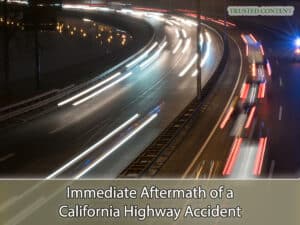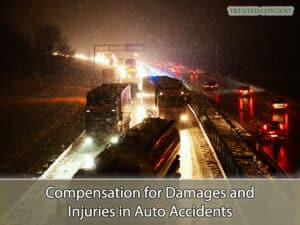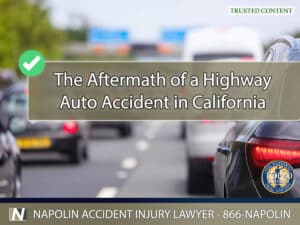Navigating the Aftermath of a Highway Auto Accident in Ontario, California
Experiencing a highway auto accident can be a traumatic and overwhelming event, leaving victims uncertain about the steps they need to take to ensure their safety and protect their legal rights. In California, where busy highways see countless accidents each year, it is crucial to be well-informed and prepared for such situations. This article provides a comprehensive guide for those involved in highway auto accidents, outlining the essential actions to take immediately after the incident, the importance of police and medical involvement, and the necessary steps for reporting and seeking compensation.

Immediate Aftermath of a California Highway Accident
Immediate Aftermath of a California Highway Accident
Check for Injuries
Immediately after an accident, check for any injuries to yourself or passengers. California law requires that a driver involved in an accident must offer reasonable assistance to anyone injured. This includes either transporting the injured person to a medical facility or arranging transportation for treatment when it's necessary or requested by the injured party. If the car is operational and the accident is minor, move the vehicle to the shoulder or a safer nearby location to avoid blocking traffic and to reduce the risk of further accidents. If possible, turn on your hazard lights to alert other drivers. Moving the vehicle doesn't affect the question of fault.
Contact Emergency Services
Whether the accident involves significant damage or injuries, calling 911 is crucial. They will dispatch medical services if there are injuries and police to file an official report. The presence of law enforcement is essential for documenting the accident scene impartially, which is invaluable when determining fault and handling insurance claims.
Exchange Information
Swap information with the other driver(s) involved in the accident. If requested, the driver and any injured occupants must show their driver’s license (take note of the license number) or other available identification to any injured person, other involved drivers or occupants, and to police or traffic officers at the scene. Other information should include full names, addresses, phone numbers, insurance company details, policy numbers, and vehicle details like make, model, and license plate number. Conduct this exchange politely and avoid discussing the specifics of the accident or attributing fault.
This approach will help ensure that all legal requirements are met (California Vehicle Codes 20002 & 20003), while minimizing potential disputes about liability.
The Value of Law Enforcement in California Auto Accidents
In most circumstances, involving the police after a highway auto accident is highly beneficial. Whether the accident is minor or results in significant damage, the police can help secure the scene and alert other drivers to potential hazards.
Creating a Police Report
A police report is an essential document that records the details of the accident. This report can significantly influence the determination of fault and is often required by insurance companies to process claims. It provides an unbiased account of the incident, including statements from involved parties and witnesses. This documentation can be a pivotal piece of evidence in legal proceedings, ensuring that the facts are clearly presented and aiding in a fair resolution.
Reporting the Accident
Notifying Your Insurance Company
Timely notification to your insurance company is critical following a highway auto accident. Insurance policies typically have specific timeframes within which an accident must be reported. Failing to report the incident promptly can lead to complications or even denial of your claim. Review your insurance policy to understand the exact requirements and ensure that you meet these deadlines to facilitate a smoother claims process.
Reporting to the DMV
In California, drivers involved in significant accidents must report the incident to the Department of Motor Vehicles (DMV). Under California Vehicle Code 16000, any accident resulting in damages exceeding $1,000, bodily injury, or death must be reported within ten days. This report can be submitted by the driver or a representative, such as an insurance agent or attorney. Accurate and timely reporting is crucial for compliance with state regulations and for ensuring that all necessary documentation is in place for future legal or insurance proceedings.

Compensation for Damages and Injuries in Auto Accidents
Compensation for Damages and Injuries in Auto Accidents
Filing a Claim with the At-Fault Driver’s Insurance
If the accident was caused by another driver, filing a claim with their insurance company is a viable option. This process involves submitting detailed information about the accident and the damages incurred. One advantage of this approach is that you are not required to pay a deductible. However, it may take longer to receive a settlement, as the at-fault driver's insurance company will need to investigate the claim thoroughly.
Filing a Claim with Your Own Insurance
Alternatively, you may choose to file a claim with your own insurance company, especially if you need immediate financial assistance to cover medical expenses or vehicle repairs. Although this option might provide quicker access to funds, it typically requires you to pay a deductible upfront. Your insurance company may then seek reimbursement from the at-fault driver's insurer through a process called subrogation.
Legal Action Against Uninsured or Underinsured Drivers
In cases where the at-fault driver is uninsured or underinsured, you might consider legal action to secure compensation. Consulting with an experienced attorney can help you determine the best course of action, whether it involves filing a personal injury lawsuit or seeking other legal remedies. A lawsuit can potentially provide higher compensation, including coverage for non-economic damages like pain and suffering, though it may take longer to resolve.
Legal Considerations and Actions Post-Accident
Understanding Liability and Fault
Determining liability in a highway auto accident is a critical aspect of the legal process. California follows a comparative negligence rule, which means that more than one party can be held responsible for an accident. The percentage of fault assigned to each party directly affects the compensation they can receive (for non-economic damages by default). For instance, if you are found to be 20% at fault for the accident, your compensation will be reduced by 20%. For economic damages, joint liability is presumed. In other words, all defendants could be held responsible for the entire amount, depending on specific circumstances. Understanding these nuances can significantly impact the outcome of your claim.
Documenting the Accident Scene
Thorough documentation of the accident scene can provide invaluable evidence for your claim. If you are physically able, take the following steps:
- Photograph the vehicles involved from multiple angles, capturing all damages.
- Photograph any visible injuries you or your passengers have sustained.
- Collect contact information from all parties involved, including witnesses.
- Note the weather, road conditions, and any other relevant factors that may have contributed to the accident.
- Write down your account of the accident as soon as possible while the details are still fresh in your memory.
Medical Documentation and Treatment
Seeking immediate medical attention after an accident is crucial, not only for your health but also for legal and insurance purposes. Medical records serve as essential evidence of the injuries sustained and the treatment required. Follow these guidelines to ensure proper documentation:
- Visit a healthcare provider promptly, even if injuries seem minor.
- Follow all prescribed treatments and attend follow-up appointments.
- Keep detailed records of medical expenses, treatments, and any related correspondence.
- Ensure that your healthcare provider documents the cause of your injuries and the accident's impact on your health.
Working with Insurance Companies Post Auto Accident
Communicating with Insurance Adjusters
When dealing with insurance adjusters, it is important to approach the situation with caution and clarity. Many adjusters seek to minimize the payout to protect their company's interests. Here are some tips for effective communication:
- Provide factual and concise information about the accident.
- Avoid giving recorded statements without consulting an attorney.
- Do not admit fault or speculate about the accident details.
- Keep detailed notes of all conversations with insurance representatives.
- Review any settlement offers carefully and consult with an attorney before accepting.
By following these guidelines, you can protect your interests and ensure a fair evaluation of your claim.
Understanding Insurance Coverage
Familiarizing yourself with your insurance policy can help you navigate the claims process more effectively. Key aspects to understand include:
- Coverage limits for bodily injury and property damage.
- Deductibles and out-of-pocket expenses.
- Uninsured and underinsured motorist coverage.
- Medical payments coverage and its limitations.
- Rental car coverage if your vehicle is being repaired.
Seeking Legal Assistance for California Auto Accidents
The Role of an Attorney
Attorneys provide essential services such as investigating the accident and gathering evidence, negotiating with insurance companies on your behalf, and representing you in court if a lawsuit becomes necessary. They also offer valuable advice on the best course of action based on your unique circumstances and ensure that all legal deadlines and requirements are met. An attorney's expertise can help you navigate the complexities of the legal system and work towards securing the compensation you deserve.
Choosing the Right Attorney
It is important to consider their experience and specialization in personal injury and auto accident cases. A strong reputation and a track record of successful outcomes are also vital indicators of their capability. Additionally, the attorney's availability and willingness to communicate regularly can make a significant difference in the level of support and clarity you receive throughout the process. Transparency regarding costs and the fee structure is another critical factor to consider. Finally, reviewing client testimonials and feedback can provide insight into the experiences of past clients and help you make an informed decision. By carefully evaluating these factors, you can find an attorney who is well-equipped to handle your case and advocate for your best interests.

Navigating the Aftermath of a Highway Auto Accident in Ontario, California
Navigating the Aftermath of a Highway Auto Accident in Ontario, California
If you have been involved in a highway auto accident in California, taking the right steps in the aftermath is crucial to protecting your health, legal rights, and financial well-being. Timely medical attention, thorough documentation, and understanding the intricacies of the insurance and legal processes can make a significant difference in the outcome of your case.
At Napolin Accident Injury Lawyer, we are dedicated to helping accident victims navigate these challenges with confidence and clarity.
Our team has extensive litigation experience and is committed to providing personalized legal assistance tailored to your unique situation. We understand the complexities of auto accident cases and are here to guide you every step of the way. If you need expert legal help, do not hesitate to reach out. Contact us at (909) 962-8415 for a free consultation near the Inland Empire. Let us help you secure the compensation you deserve and support you through this difficult time.
